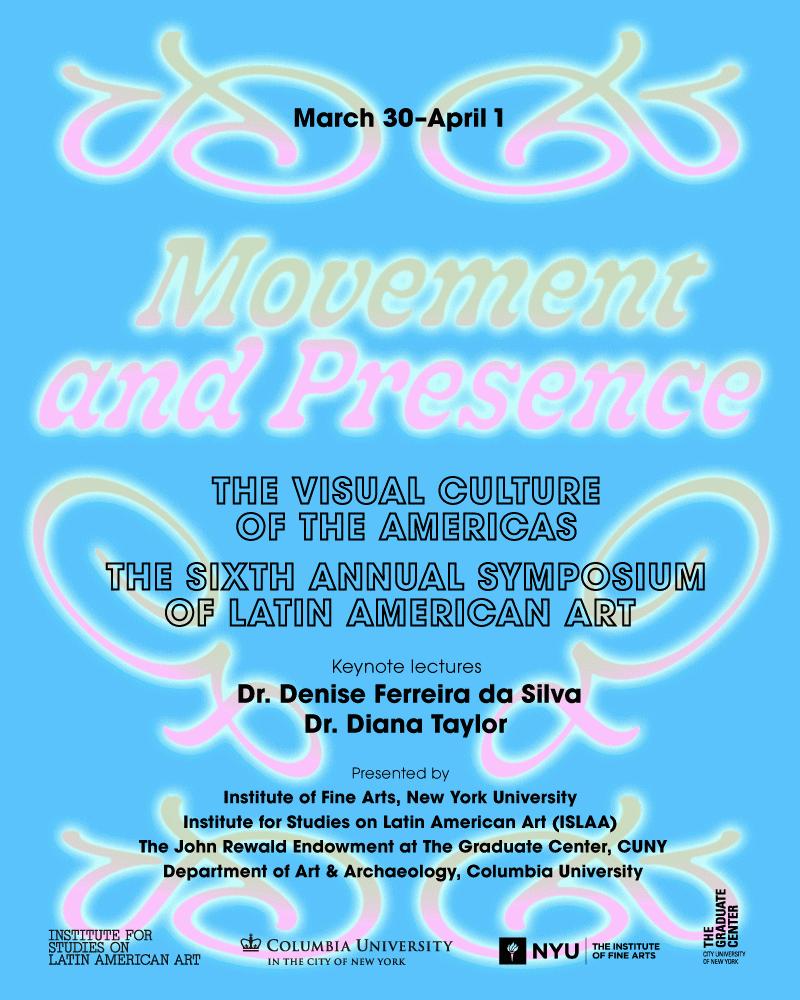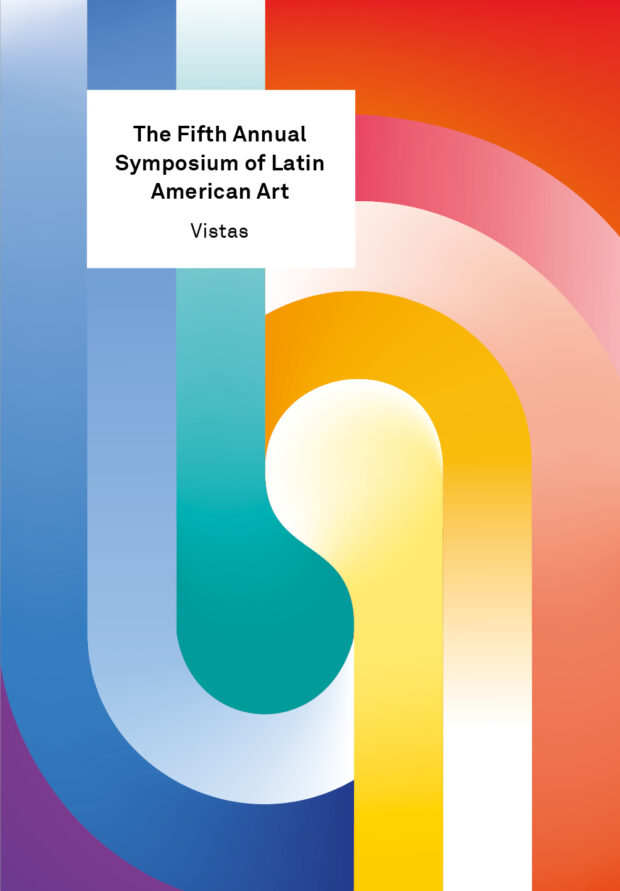MOVEMENT & PRESENCE: THE VISUAL CULTURE OF THE AMERICAS
The Institute of Fine Arts at New York University, The Graduate Center at the City University of New York, Columbia University in the City of New York, and the Institute for Studies on Latin American Art (ISLAA) are pleased to announce the Sixth Annual Symposium of Latin American Art. “Movement & Presence: The Visual Culture of the Americas” will be held on March 30, 31, and April 1, 2022. The Symposium will include keynote presentations by Dr. Denise Ferreira da Silva and Dr. Diana Taylor.
“Latin America”—the idealized landscape, geospatial entity, and sociocultural construct—has been shaped and mythologized by, through, and against movement. The invention of America and, later, of Latin America, legitimized and enabled the dispossession of land and Indigenous lifeways—of Abya Yala and Turtle Island, for example—into the Euro-Christian imaginary and facilitated the colonial and imperial expansion of the West across the globe. These inventions enabled the mass movement of people, goods, images, and ideas through the processes of African and Indigenous enslavement, resource extraction, global capitalism, and the implementation of borders. Similarly, “latinidad,” a unifying identity-construct for Latin America’s diaspora in the U.S.—with its erasures of Black, Indigenous, and Asian lived experiences—is also predicated on this mobility: it is an identity which is forged through migration and the crossing of borders. However, Indigenous worldviews, migration, and networks of cross-cultural exchange are also forms of movement which predate and intersect with this very idea, offering modes of resistance to ongoing processes of coloniality. Movement is an intentional, embodied presence that invokes cross-temporal and cross-spatial histories, as well as futurities. Closely related to movement are the experiences of community, networks, continuity, and presence. As Diana Taylor writes, being present, or ¡Presente!, constitutes a decisive act of resistance and solidarity.
The faculty advisors for the Annual Symposium of Latin American Art are Edward J. Sullivan, Deputy Director and Helen Gould Shepard Professor in the History of Art, the Institute of Fine Arts and College of Arts and Sciences, New York University; Anna Indych-López, Professor, Art History, The Graduate Center, City University of New York (CUNY) and The City College of New York (CCNY) (CUNY), Kirk Varnedoe Visiting Professor of Modern Art, the Institute of Fine Arts, New York University; Katherine Manthorne, Professor, Art History, The Graduate Center, City University of New York (CUNY); Lisa Trever, Lisa and Bernard Selz Associate Professor in Pre-Columbian Art History and Archaeology, Columbia University; and Jerónimo Duarte-Riascos, Assistant Professor, Department of Latin American and Iberian Cultures, Columbia University. The Symposium is organized by Ph.D. Students Mónica Ramírez Bernal, Chloë Courtney, Kerry Doran, Cathryn Jijón, Shannah Rose, and M.A. Candidate Sophia Gebara.
How to Attend
The Symposium will be held entirely online. Following submission of your RSVP, a Zoom link will be provided via email in advance of each day of the conference.
Please note that presentations will be given in English, Portuguese, or Spanish. Autogenerated captioning will be available. Panel titles and full presenter details, including the language of each presentation, are available below.
Register for Day 1 – Register for Day 2 – Register for Day 3
Day 1: Wednesday, March 30:
3:30 pm – Opening Remarks
Dr. Edward J. Sullivan, Deputy Director and Helen Gould Shepard Professor in the History of
Art, the Institute of Fine Arts and College of Arts and Sciences, New York University
Dr. Blanca Serrano Ortíz de Solórzano, Project Director, Institute for Studies on Latin American Art (ISLAA)
3:45 – 5:15 pm – Panel 1: Contando histórias, narrando lembranças
Alejandra R. Bolaños (she/her/ella), Artist and Coordinator of Bruma Laboratoria
“MUNDO SABANA. Chapter One. Las Sirenas Tentonas: Three Radio Episodes about Peteneras, Huapango and Female Disobedience in the Huasteca” (Spanish)
Iliriana Fontoura Rodrigues (she/her), M.A., Culture and Territoriality, Universidade Federal Fluminense
“Memories for the Future: Photographic Collections of Rural Black Families (Timbaúva/Brazil)” (English)
Discussant: Dr. Gabriela Germana, Visiting Assistant Professor of Instruction in Contemporary Art History, School of Art and Art History, University of South Florida (Spanish)
Student Moderator: Chloë Courtney, Ph.D. Student, the Institute of Fine Arts, New York
University
6 pm – Keynote Presentation
Introduction: Dr. Anna Indych-López, Professor, Art History, The Graduate
Center, City University of New York (CUNY) and The City College of New York (CCNY) (CUNY); Kirk Varnedoe Visiting Professor of Modern Art, the Institute of Fine Arts, New York University
After It’s All Said … : Reading Art as Confrontation
Dr. Denise Ferreira da Silva, Professor and Director of the Institute for Gender, Race, Sexuality and Social Justice, University of British Columbia
Day 2: Thursday, March 31:
11 am – Welcome
Dr. Jennifer Ball, Executive Officer, PhD Program in Art History and Professor, Art History, The Graduate Center and Brooklyn College, City University of New York (CUNY)
11:15 am – 12:45 pm – Panel 2: Emplazar el lugar
Juan Carlos G. Mantilla (él/he), Doctoral Fellow, Social Science Research Council,
Columbia University
“How to Depict the Origins of the World? The Antisuyo as a Temporal Frontier in the Early Modern Andes” (English)
Victoria Horrocks (she/her), M.A. Student, Modern and Contemporary Art: Critical and
Curatorial Studies, Columbia University
“Narratives of Coloniality in Frederic Church’s Heart of the Andes” (English)
Elena Vanasse Torres (she/her), M.A. Student, The Roger Thayer Stone Center for
Latin American Studies, Tulane University
“Enjambre Silvestre al Servicio de Nadie: Mapping Other Worlds through Plot and
Parcela on Isla Vieques, Puerto Rico” (English/Spanish)
Discussant: Dr. Jennifer Saracino, Assistant Professor, Art History, School of Art,
University of Arizona
Student Moderator: Shannah Rose, Ph.D. Student, the Institute of Fine Arts, New York
University
Day 3: Friday, April 1:
10 am – Welcome
Dr. Katherine Manthorne, Professor, Art of the Americas, The Graduate Center, City University of New York (CUNY)
10:15 – 11:45 am – Panel 3: (Re)Enactments: Performance and Public Space
Monica Espinel (she/her), Ph.D. Student, The Graduate Center, City University of New York (CUNY)
“Embodying the Abject: Maria Evelia Marmolejo’s Anónimo 4 (1982)” (English)
Macarena Deij Prado (she/her), Ph.D. Candidate, Art History, University of Florida
“The Virgin of Chiquinquirá in Movement: Interpreting the Dynamic Presence of a
Miraculous Painting in Procession” (English)
Aline Hernández (she/her), Ph.D. Candidate, Art History, St. Andrews University
“Doubling Down on the Spectacle: The Performative (After)Lives of Feminicide
Photojournalism in Contemporary Mexico” (English)
Discussant: Dr. Claire Bishop, Professor, Art History, The Graduate
Center, City University of New York (CUNY)
Student Moderator: Cathryn Jijón, Ph.D. Student, The Graduate Center, City University of New York (CUNY)
12 – 1:15 pm – Keynote Presentation:
Introduction: Dr. Christine Poggi, Judy and Michael Steinhardt Director and Professor of Fine Arts, the Institute of Fine Arts, New York University
The Politics of Presence
Dr. Diana Taylor, University Professor and Professor of Performance Studies and Spanish, New York University
2:30 – 4 pm – Panel 4: Unfixed Identities
Bat-ami Artzi (she/her), Fellow, Dumbarton Oaks Research Library and Collection
“Moving Between Past and Present: A Queer Reading of Ancient Andean Art” (English)
Caroline Ricca Maruyama Lee (they/them), Artist and Researcher at the Center for Studies on Social Markers of Difference, University of São Paulo (NUMAS-USP)
“MOTHER/land — Body-cartographies of Race and Gender in the
Asian-Brazilian Identity” (English)
Joseph Shaikewitz (he/they), Ph.D. Student, the Institute of Fine Arts, New York
University “Crossing Borders and Cross-Dressing in Julián Soler’s Me ha besado un
hombre (1944)” (English)
Discussant: Dr. C. Ondine Chavoya, Professor of Art and Latina/o Studies, Williams
College
Student Moderator: Kerry Doran, Ph.D. Student, The Graduate Center, City University of New York (CUNY)
Additional Programming for Panelists
In addition to the public panels, Movement & Presence: The Visual Culture of the Americas includes two participatory workshops for panelists.
Moving Into and Beyond Contexts of Our Gender Identities (Moving Rasa), designed and led by Andrew Suseno, is an experiential movement workshop for all participants to explore the relationship of gender identity with how we relate to the spaces, knowledge and bodies we occupy. Suseno writes, “My hope is to set the stage of this conference, your Zoom space, as a place to partner with you to interrogate and reimagine relationships to colonialism and gender identities. For most of us, our relationship to place is fraught with violence and harm that we have experienced and also caused. Together we will play with slowing things down, mourning and finding forgiveness, and creating opportunities for hidden layers and connections in our consciousness to emerge.”
Andrew Suseno is an Indonesian American cis-hetero male addressing systems of oppression that harm our bodies, relationships and communities through the power of critical and creative movement and contact improvisation. He developed Moving Rasa over the last decade to decolonize his practice as a doctor of physical therapy, a performing artist, somatic therapist, as well as his roles as a father, a husband, a friend and a citizen. Rasa is the Sanskrit word for ‘essence,’ which Moving Rasa seeks to connect to through an investigation of consciousness using play, ancestral wisdom, somatics and anti-oppression practice.
Decolonial Love Letter: A Workshop on Chinese and African Aesthetics in Latin American and Caribbean Art, designed and led by Tao Leigh Goffe
Introduction: Dr. Jerónimo Duarte-Riascos, Assistant Professor, Department of Latin
American and Iberian Cultures, Columbia University
Decoloniality is a school of thought originating in Latin America that decenters the primacy of European aesthetics and values. From the lens of competing global modernities and their attendant aesthetics, in this 90-minute workshop participants will be introduced to Chinese and African diaspora art-making. First, we will examine migration patterns across Latin America and the Caribbean for Afro and Chinese diasporic subjects in a brief lecture. Then using a virtual platform we will collaboratively examine works of art by Latin American and Caribbean diasporic artists to form a digital constellation of visual and material culture in conversation with decolonial theorists who provide the structure for worlds otherwise.
Tao Leigh Goffe is an award-winning writer and DJ specializing in the origin stories that emerge from histories of race, empire, climate, and technology. Her story was featured as an experimental short film on Hulu’s Initiative 29 that celebrates Black history, heroes, and futurism. Writing recipes, curating exhibitions, and producing mixed media art, she explores the full range of the human sensorium in her artistic practice.
—
Announcement: Vistas 7: Touch, Taste, Turn: Unleashing the Senses in the Arts of the Americas
ISLAA is pleased to announce the release of the latest issue of Vistas, Vistas 7, dedicated to the 2021 Fifth Annual Symposium of Latin American Art.
ISLAA’s support for the Annual Symposium of Latin American Art, and the participating emerging scholars, extends to its publication Vistas: Critical Approaches to Modern and Contemporary Latin American Art. Every year, a selection of papers given at the Annual Symposium are published in a dedicated journal issue, edited by a student organizer and published by ISLAA. Taken together, Vistas represents a vital complement to the Annual Symposium as well as a compendium of promising and energetic new research. ISLAA will dedicate a forthcoming issue of Vistas to the 2022 Sixth Annual Symposium of Latin American Art.
In keeping with its mission to advance scholarship and public engagement with Latin American art, ISLAA posts Vistas online and open access. To browse previous issues, please visit www.islaa.org/vistas.

